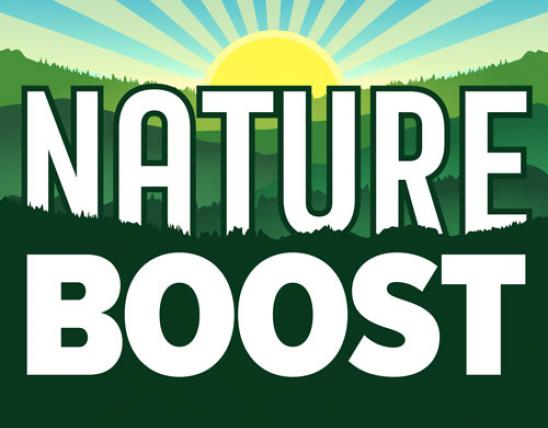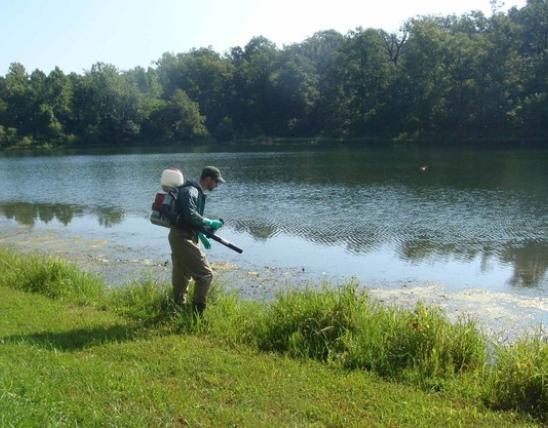NatureBoost
Revisiting Paddlefest
[Bird cry in distance.]
[Music playing.]
Speaker: Hey there, and welcome back to Nature Boost. I'm Jill Pritchard with the Missouri Department of Conservation. You may remember our episode last year featuring my ultimate kayaking adventure on the Missouri and Mississippi Rivers. I got the chance to get my paddle wet, not only on the river's confluence but also at a Paddlefest event sponsored by the Mississippi River Network, the Audubon Center at Riverlands, the U.S. Army Corps of Engineers and the American Canoe Association. Paddlefest was held at the back waters of the Mississippi River at Riverlands Migratory Bird Sanctuary in West Alton.
Speaker: So, Jill after you get over there you get to show me that stroke for turning the boat.
Speaker: Okay, alright
Speaker: I want you to explain to me what you're doing.
Speaker: Okay. So, to turn to the left I'm going to do a big stroke on the right.
Speaker: Make the--
Speaker: And then a back stroke on the left!
Speaker: Right, yeah. And you make that big, wide arch. [Water lapping.] The further you reach out there, the more power you have. Make sure your blade is completely buried.
Speaker: Alright.
Speaker: There you go, you got it.
Speaker: I'm learning, I'm learning.
Speaker: Yeah.
Speaker: That's a cool trick.
Speaker: Yeah, so it's called a sweep stroke.
Speaker: Sweep stroke.
Speaker: Mmhmm.
Speaker: You may recognize the voice my instructor, American Canoe Association Director for Missouri, Perry Whitaker. He's the same guy who attempted to break the Guinness World Record for fastest team to canoe the whole Mississippi River. Go back and listen to our paddling episode from September to hear his story.
[Music playing.]
Speaker: The really cool part about beginner's paddling programs is that they're exposing many to a new sport, but also offering instruction from experienced and certified instructors.
[2:00]
[Distant speaking.]
Speaker: Hi Christie, I'm Jill.
Speaker: Hi, Jill!
Speaker: Christina, what did you like about today?
Speaker: I love the fact that it was just a small group and everyone on the water was so helpful. Like, I know I probably talked to 4 or 5 people. "No, do it this way. No, do it this way. If you do it this way . . ." And so, I learned - I've kayaked before but I probably learned more today than all the times I've ever kayaked.
Speaker: It's super helpful.
Speaker: Super helpful. I'm like, "When is this again so I can come back?" I really liked it. It was my first time ever doing anything like that. I swim all the time but I have never been in a boat by myself paddling. I've not been canoeing, I've not been kayaking so I really enjoyed it. It was a different experience for me.
Speaker: Would you try it again?
Speaker: I would try it again.
Speaker: Do you want to get your own kayak now?
Speaker: I do want to get my own kayak now! I could match the colors with the vest and it would be beautiful.
[Music playing.]
Speaker: Getting out your kayak or canoe is a popular pastime in the warmer months, but it can be enjoyed nearly all year round. Missouri is home to numerous streams, rivers, and lakes that make for great options no matter your skill level. And to keep on the nature boost theme of outdoor health benefits, there are many when it comes to this water sport. It promotes weight loss, can increase your focus, relieve stress and anxiety, and it's just a fun activity to do with friends and family. It can even help you explore where you live differently and find new places to float. More paddling fun right after the break.
[Music.]
Speaker: Summer is more refreshing on the water. From fast boats to slow floats, a rod and reel or a tasty meal, there are as many things to do on the water as there are people to share it with. Missouri, the water is calling. How will you respond?
Speaker: [Singing.] Oh, let me be on the water. Yeah, yeah.
Speaker: Discover on the water at MissouriConservation.org.
Speaker: And welcome back to Nature Boost where we're looking back at a Paddlefest event I attended last summer at Riverland's Migratory Bird Sanctuary near St. Louis. At the event we spoke with Corinne O'Brien, a Park Ranger with the Army Corps of Engineers in the St. Louis district. Corinne gave us some really cool background information about the area and the different wildlife you can see.
Speaker: This area within the river project - this is the Riverlands Migratory Bird Sanctuary - this is a really unique area because of all of the different habitats that are located here. So we have a variety of wetland areas, wetland marshes, as well as bottomland forest, prairie as well as sand prairie. That's really unique, a great habitat for a lot of different species that's really fun to see. [Birds chirping in distance.] So, we have a really interesting combination of our stewardship here at this location just north of the Melvin Price Lock and Dam. The dam is actually what creates this area and this habitat by the pooling effect of the water. This whole area kind of came about as a mitigation effort from the creation of the dam in the 1980s, and ever since then we've really worked to incorporate much more of the stewardship specifically here for our wildlife habitat as well as a recreational destination that's just about 20 minutes north of Downtown St. Louis.
[Birds in distance.] We've had over 325 bird species that have been identified just right here in this location, which is really great. We're right along the Mississippi River flyway, so we get about 60 percent of the North American bird species that use that migratory flyway on their journeys north and south to breeding and wintering grounds. So we get a really amount of variety from shore birds, a lot that actually are endangered or have been endangered that we have seen and encountered here.
[6:00]
We also have the largest number of gull species that have been recorded at Riverlands. I'm not sure off the top of my head, but I think it's somewhere like 22 or 23 species that have been recorded right here, and that's just birds. [Birds in distance.]
We have a lot of really talented birders and really talented photographers that seek this destination out. You'll see them really early in the morning with their very large spotting scopes out and spending a lot of time trying to get that perfect shot of the wildlife, specifically birds.
[Music playing.]
Speaker: We have a really unique partnership with a lot of different organizations for this area as well. So, the Army Corps of Engineers partners with the National Audubon Society and we have the Audubon Center at Riverlands that kind of helps maintain this area and does a lot of education outreach, as well as one of our local water trail associations, the Mississippi River Water Trail Association. So, the three of us together have helped to bring out a bunch of paddlers today to get them really used to recreating and enjoying their natural resources despite what their comfort levels might be. [Chatting in distance.] So, this is something that a first-time paddler could enjoy and kind of get the basics of paddling, as well as someone who's a skilled paddler that comes out here all the time just to have a chance to connect with nature and really connect with the area and what Riverlands has to offer. It's a really great connection we all have, all with one another and the partnerships. I think that really is visible here at Riverlands, and then we love to share how much we love Riverlands with our guests and kind of create a great space for everyone to come out and enjoy. I think that it's really evident with our visitors as they come out, and I think it's just a really great place that people are really excited to come see and recreate in.
[Bird cry.]
[8:00]
[Music playing.]
Speaker: Oh, it was so much fun. This is my first time kayaking and paddling. It was so much fun and everyone was so helpful, and I definitely got a great workout too. [Laughter.]
Speaker: It does! Your back!
Speaker: It does!
Speaker: I'm sure you'll feel it tomorrow. Now, my main question is do you want to get on one of those paddle boards standing up on it?
Speaker: Ooh, I do want to try it.
Speaker: It's fun. I would definitely recommend it.
Speaker: I'm definitely looking forward to future events. I definitely will be back on the water again.
Speaker: Oh, that's what I love to hear! That's awesome. What's your name? [Laughter.]
Speaker: I'm John.
Speaker: How did you like Paddlefest?
Speaker: I liked Paddlefest very much. It was a little different than what I was accustomed to or what I thought it would be, but all in all it was good and I met a couple of people out here. The instructors were great, I learned a few pointers that I didn't know about. So, it wasn't my first time kayaking but I learned a little bit more. It will be helpful in the future.
Speaker: Oh, absolutely. Do you like being out in nature?
Speaker: I do. If I'm outdoors, it's the best thing to me. I don't like the sun too much, but being outside in nature camping, kayaking. I'm trying to learn to fish a little bit more because I haven't been able to catch very much, so I just say I'm pretend fishing. But all in all, I'm trying to learn more and be out in nature more.
Speaker: Oh, that's what I love to hear. That's awesome. Thank you.
Speaker: [Laughs.] Thank you.
Speaker: Thank you guys! That was great!
If you're paddling solo or with pals, it's always important to do so safely. Wear your life jacket, make a float plan and tell someone where you're going and when you plan to return, use caution and yield to larger boats. And, pack water, food and dry clothes.
[Music fades in.]
Though Paddlefest has already passed for 2022, there are still many free kayaking programs offered throughout this summer and Fall through MDC.
[10:00]
Just check out our events page at MissouriConservation.org to find a program in your region. I want to thank Perry Whitaker with the American Canoe Association and Corinne O'Brien with the U.S. Army Corps of Engineers for appearing on this episode. I'm Jill Pritchard with the Missouri Department of Conservation urging you to get your daily dose of the outdoors.
[Music playing.]
[Laughter in distance.]





















